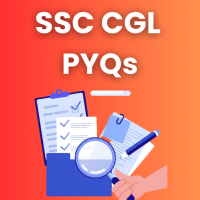SSC CGL Exam > SSC CGL Questions > Complete the sentence: "By the time the proje...
Start Learning for Free
Complete the sentence: "By the time the project ends, we _____________ on it for over six months."
- a)will have been working
- b)will be working
- c)will have worked
- d)will be work
Correct answer is option 'A'. Can you explain this answer?
Verified Answer
Complete the sentence: "By the time the project ends, we _____________...
The correct completion is "By the time the project ends, we will have been working on it for over six months." In the Future Perfect Continuous Tense, 'will have been' is used, followed by the '-ing' form of the verb, to indicate the duration of an ongoing action up until a future point.
View all questions of this test
Most Upvoted Answer
Complete the sentence: "By the time the project ends, we _____________...
Understanding the Correct Answer: "will have been working"
The correct option, "will have been working," is an example of the future perfect continuous tense. This tense is used to describe an action that will be ongoing until a specific point in the future. Here’s a breakdown of why this answer is correct.
Future Perfect Continuous Tense
- This tense indicates an action that will have been in progress for a duration of time by a certain future date.
- In the given sentence, "by the time the project ends" establishes a future point in time, which is crucial for using this tense.
Duration of Action
- The phrase "for over six months" highlights the duration of the work on the project.
- The future perfect continuous tense emphasizes that the action (working on the project) will have been happening continuously up to the end of the project.
Incorrect Options
- Option b: "will be working": This implies ongoing action at a future time but does not convey the completion of a specific duration.
- Option c: "will have worked": This suggests a completed action by that future time but does not indicate the continuous nature of the work.
- Option d: "will be work": This is grammatically incorrect as it lacks the appropriate verb form.
Conclusion
- The sentence thus accurately reflects a continuous action that has been occurring over a defined period leading up to a future point, making "will have been working" the best choice.
The correct option, "will have been working," is an example of the future perfect continuous tense. This tense is used to describe an action that will be ongoing until a specific point in the future. Here’s a breakdown of why this answer is correct.
Future Perfect Continuous Tense
- This tense indicates an action that will have been in progress for a duration of time by a certain future date.
- In the given sentence, "by the time the project ends" establishes a future point in time, which is crucial for using this tense.
Duration of Action
- The phrase "for over six months" highlights the duration of the work on the project.
- The future perfect continuous tense emphasizes that the action (working on the project) will have been happening continuously up to the end of the project.
Incorrect Options
- Option b: "will be working": This implies ongoing action at a future time but does not convey the completion of a specific duration.
- Option c: "will have worked": This suggests a completed action by that future time but does not indicate the continuous nature of the work.
- Option d: "will be work": This is grammatically incorrect as it lacks the appropriate verb form.
Conclusion
- The sentence thus accurately reflects a continuous action that has been occurring over a defined period leading up to a future point, making "will have been working" the best choice.

|
Explore Courses for SSC CGL exam
|

|
Question Description
Complete the sentence: "By the time the project ends, we _____________ on it for over six months."a)will have been workingb)will be workingc)will have workedd)will be workCorrect answer is option 'A'. Can you explain this answer? for SSC CGL 2025 is part of SSC CGL preparation. The Question and answers have been prepared according to the SSC CGL exam syllabus. Information about Complete the sentence: "By the time the project ends, we _____________ on it for over six months."a)will have been workingb)will be workingc)will have workedd)will be workCorrect answer is option 'A'. Can you explain this answer? covers all topics & solutions for SSC CGL 2025 Exam. Find important definitions, questions, meanings, examples, exercises and tests below for Complete the sentence: "By the time the project ends, we _____________ on it for over six months."a)will have been workingb)will be workingc)will have workedd)will be workCorrect answer is option 'A'. Can you explain this answer?.
Complete the sentence: "By the time the project ends, we _____________ on it for over six months."a)will have been workingb)will be workingc)will have workedd)will be workCorrect answer is option 'A'. Can you explain this answer? for SSC CGL 2025 is part of SSC CGL preparation. The Question and answers have been prepared according to the SSC CGL exam syllabus. Information about Complete the sentence: "By the time the project ends, we _____________ on it for over six months."a)will have been workingb)will be workingc)will have workedd)will be workCorrect answer is option 'A'. Can you explain this answer? covers all topics & solutions for SSC CGL 2025 Exam. Find important definitions, questions, meanings, examples, exercises and tests below for Complete the sentence: "By the time the project ends, we _____________ on it for over six months."a)will have been workingb)will be workingc)will have workedd)will be workCorrect answer is option 'A'. Can you explain this answer?.
Solutions for Complete the sentence: "By the time the project ends, we _____________ on it for over six months."a)will have been workingb)will be workingc)will have workedd)will be workCorrect answer is option 'A'. Can you explain this answer? in English & in Hindi are available as part of our courses for SSC CGL.
Download more important topics, notes, lectures and mock test series for SSC CGL Exam by signing up for free.
Here you can find the meaning of Complete the sentence: "By the time the project ends, we _____________ on it for over six months."a)will have been workingb)will be workingc)will have workedd)will be workCorrect answer is option 'A'. Can you explain this answer? defined & explained in the simplest way possible. Besides giving the explanation of
Complete the sentence: "By the time the project ends, we _____________ on it for over six months."a)will have been workingb)will be workingc)will have workedd)will be workCorrect answer is option 'A'. Can you explain this answer?, a detailed solution for Complete the sentence: "By the time the project ends, we _____________ on it for over six months."a)will have been workingb)will be workingc)will have workedd)will be workCorrect answer is option 'A'. Can you explain this answer? has been provided alongside types of Complete the sentence: "By the time the project ends, we _____________ on it for over six months."a)will have been workingb)will be workingc)will have workedd)will be workCorrect answer is option 'A'. Can you explain this answer? theory, EduRev gives you an
ample number of questions to practice Complete the sentence: "By the time the project ends, we _____________ on it for over six months."a)will have been workingb)will be workingc)will have workedd)will be workCorrect answer is option 'A'. Can you explain this answer? tests, examples and also practice SSC CGL tests.

|
Explore Courses for SSC CGL exam
|

|
Signup for Free!
Signup to see your scores go up within 7 days! Learn & Practice with 1000+ FREE Notes, Videos & Tests.


















